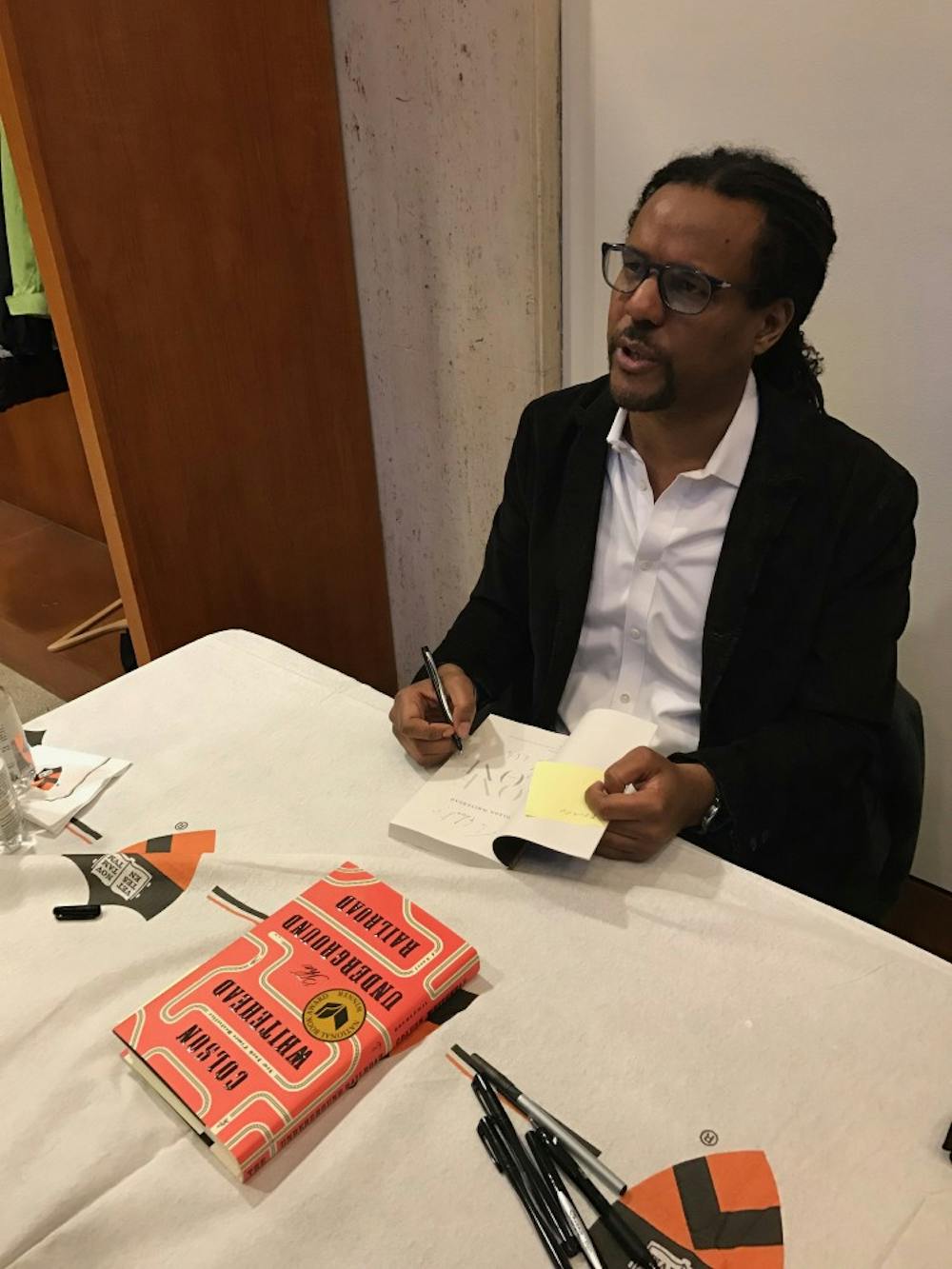In a standing room-only lecture on March 6, author Colson Whitehead read an excerpt from his 2016 novel “The Underground Railroad,” which won the National Book Award, and discussed his path to writing.
Assistant professor of English Kinohi Nishikawa first introduced Whitehead, calling him a prominent voice of his generation.
“Looking over Colson Whitehead’s career, we see a recurrent theme. Every new book Whitehead writes seems to herald the voice of our age,” Nishikawa said. “To read Whitehead isn’t so much to enter a time warp, but a time continuum.”
Whitehead infused his talk with humor and levity, as he discussed his upbringing and the day-to-day routines of being a writer.
“I usually spend Monday afternoons in my apartment reeling over my regrets, so this is a nice change of pace for me,” Whitehead joked.
He spoke about his childhood in Manhattan and his early love of books, including comics and novels written by Stephen King. Whitehead mentioned that his early experiences with books influenced his later decision to become a writer.
“It seemed in sixth grade [that] being a writer was a great job; you didn’t have to wear clothes or talk to people,” Whitehead said. “At that point, I wanted to write the black ‘Shining’ — basically, if you take any Stephen King title and put the black before it.”
He said that he started reading modernist authors, like Samuel Beckett, during his freshman year at Harvard University in 1987. However, he explained that his writing journey in college was not exactly smooth.
“I considered myself a writer, but didn’t write anything,” Whitehead said. “Eventually I gathered my forces and wrote two five-page stories to audition for the creative writing classes, but I was turned down each time.”
After graduation, Whitehead worked at alternative newsweekly The Village Voice in New York City from 1991 to 1997. He started writing by approaching the paper’s TV editor, and first wrote a piece about the series finales of the shows “Growing Pains” and “Who’s the Boss.”
Whitehead eventually became confident enough to write his own fiction; he decided to write a novel about a child star that was based on Gary Coleman, an actor who portrayed an African-American child raised by Caucasian parents on the 1980s sitcom “Diff’rent Strokes.” Whitehead obtained an agent to spread the word about the book, but was discouraged to find that his manuscript was rejected by many different publishing houses.
During this time, Whitehead began to have “bizarre thoughts,” but he found solace in the disco music of the ’70s and top-40s radio, such as Donna Summer’s “MacArthur Park.” He joked that the song spoke to his artistic journey.
“Knopf Publishing Group, why did you leave my cake out in the rain?” Whitehead said, referencing the lyrics of the song.
Whitehead also discussed his recent novel, “The Underground Railroad,” and described the idea for the novel, which first came to him 16 years ago.
“I was sitting on my couch and saw a reference [to the Underground Railroad] and remembered how in elementary school I thought it was actually an underground subway,” Whitehead said. “I thought ‘Oh, that’d be a good idea for a novel,’ adding complicating elements where each state the protagonist went through was different, like Gulliver’s Travels.”
Whitehead decided to wait on writing that book until he was more mature, but about three years ago, he asked his wife what she thought about the idea.
“She said it sounded better than my other proposal, which was about a Brooklyn writer going through a midlife crisis,” he explained.
Whitehead added that his agent and editor liked the idea as well, so he began putting together the story and conducting research. He then read a series of excerpts from his novel, describing it as centered around a slave girl, Cora, who is 17 or 18 and lives on a Georgia cotton plantation.
Whitehead read an excerpt from his novel that described Cora's plantation and a beating that Cora and another slave faced. He then read a portion about slave catcher Arnold Ridgeway as an example of the book’s “biographical chapters,” in which he explores the backstory and motivations behind his characters.
When asked why he chose Cora to be the novel’s protagonist, Whitehead explained that the novelty of exploring a mother-daughter relationship in a book appealed to him.
“I had also had a long string of meditative male protagonists in a row, so I heard a voice that said ‘Come on, Colson, let’s change it up a little,’” he added.
Whitehead described conducting research for the novel as “terrible,” considering the heavy topic.
“I drew on stuff I first read in college, like ‘Bad Blood’ by James H. Jones about the Tuskegee experiment, and slave narratives like [that of] Frederick Douglass,” he said. “I had three reckonings with research about slavery: child, college, and mid-forties with children.”
Many students were denied access to the event due to space limitations. Dean of Rockefeller College Oliver Avens and Rockefeller College administrator Karen Sisti estimated that they allowed 150 people into the lecture hall. Many audience members stood or sat on the floor of the aisles.
“I haven’t read the book yet, but have heard great things about it, so I wanted to go,” said Riley Owen ’20, who did not make it into the lecture. “It was disappointing to be turned away after waiting in line.”
The lecture was held in McCormick 101 at 4:30 p.m. on March 6. It was sponsored by the Peter S. Firestone ’62 Society of Mathey and Rockefeller Colleges, the Lewis Center for the Arts, the Humanities Council, and the Princeton Public Library.





